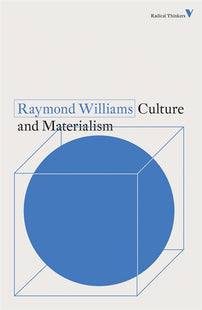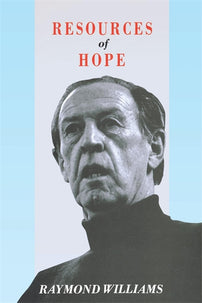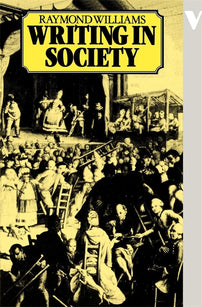Pearls before swine: Raymond Williams and ‘The Future of Marxism’
New Left Review recently republished a relatively unknown 1961 essay from Raymond Williams on the 'Future of Marxism'. In this article, Daniel Gerke responds to the article and offers an illuminating account of what is identified as the consistency of Williams’s internationalism.

Originally published on the blog of the Raymond Williams Society. Daniel Gerke will be speaking at the RWS Conference in April.
No sooner had the ink dried on my PhD thesis, ‘Raymond Williams and European Marxism: Lukács, Sartre, Gramsci’, than New Left Review published ‘The Future of Marxism’,[1] a relatively unknown 1961 essay of Williams’s that represents perhaps his most sustained analysis of international Marxism. In it, Williams assesses the progress of Soviet society, Leninism, authoritarianism, the problems of socialist development in agrarian societies, the necessity of anti-imperialism for Western socialists and the continuing relevance of Marxism in the era of the welfare state.
It is, as one would expect, a balanced and subtle account; unsurprising, then, that Perry Anderson’s contextual introduction focusses on the perplexing question of why Williams published it in The Twentieth Century,[2] a journal so committed to the anti-Marxist side in the Cold War that the CIA bankrolled it until 1958. It was ‘casting pearls before swine’, vents Anderson, and indeed the swine ignored it. There was an obvious alternative publication: New Left Review, in which, just a month before, had appeared the first part of E. P. Thompson’s critical review of The Long Revolution(1961), itself published earlier that year. Anderson bemoans the missed opportunity of a debate in the pages of NLR, in the early sixties when it really would have mattered, between these giants of the New Left, made even more tantalising by the fact that ‘The Future of Marxism’ is so different in emphasis from The Long Revolution.
In this post, I want to focus on the substance of ‘The Future of Marxism’ and see what it might have added to my more Eurocentric (and theory-centric) construction of Williams’s developing internationalism. At stake in the text, of course, is not just the question of Williams’s supposed insularity, but also his commitment to revolutionary Marxism. Indeed, this was the root of Thompson’s criticism of The Long Revolution, that it betrayed a gradualist conception of radical social change, forgoing the necessities of schism and class struggle of which imperialism and war were salient reminders for socialists in the welfare states. In ‘The Future of Marxism’, written contemporaneously with The Long Revolution, Williams, with all the necessary caveats, defends the Marxist revolutionary tradition, arguing that Lenin’s transportation of Marxism from its speculative Western European roots to revolutionary actuality in underdeveloped countries ‘has in general served the cause of human liberation in a decisive way’.[3] Moreover, a sense of the necessity of internationalism shines through the text alongside a deep suspicion of the complacency of post-war social democracy: ‘the struggle between socialists and others, in Western societies, becomes inevitably, in the first instance, a struggle over international issues […]. Indeed the continuation in Britain of this sense of an easy, improving society seems to me to depend on ignoring the fact of international military struggle, which is changing us deeply from the inside’.[4]
Is there a contradiction here? Does the strange publication of ‘The Future of Marxism’, almost in secret, simultaneous with The Long Revolution, betray a schism in Williams’s own thought between gradualism and revolutionary commitment that, like conscious and unconscious discourses, could not openly speak together? Anderson seems to think so, noting that ‘contradictions are not uncommon in major thinkers, often the price – but also the mark – of their creativity. So, certainly, it was in a case like this’.[5] My own sense is that, in these texts from the early sixties, Williams is sorting through different revolutionary strategies, which for brevity I will call the Gramscian and the Leninist, and affixing them, for historically determinate reasons, to different national contexts. Later, he would come to see both as intrinsic to revolution within any particular society.
In a forthcoming essay for Key Words,[6] I argue that Williams’s ‘long revolution’ was a version, prior to any direct engagement with Antonio Gramsci, of what the latter called a ‘war of position’, the cultural and institutional struggle for hegemony in Western capitalist countries where armed revolution was not on the cards. However, by the late seventies, as recounted in Politics and Letters (1979), Williams had come to believe that a ‘short revolution’ (in Gramscian parlance a ‘war of manoeuvre’) would also be required, even in the advanced capitalist countries. The reason was that the two strategies were dialectically and temporally bound. The long revolution was what built up the cultural and organisational capacities of the working class, rendering them capable of acting and sustaining a democratic culture afterwards; the short revolution or ‘loss by the state of its capacity for predominant reproduction of the existing social relations’, up to and including the ‘violent capture of state power’,[7] was what brought the long revolution to fruition, permitting a rigorous transformation of social forms. This was consistent, in fact, with many of Gramsci’s formulations, such as that the war of position was not a reformism but ‘a long ideological and political preparation […] to reawaken popular passions and enable them to be concentrated and brought simultaneously to detonation point’.[8]
In 1961, Williams was some way off this synthesis, but the shape of it, I think, is implied by the specific analyses of ‘The Future of Marxism’. What the title ends up being about is how Marxists in the capitalist and in the revolutionary communist societies might share their different experiences, drawing on the best of both traditions. Socialists in the West, for example, ‘can offer a tradition of critical independence and a tradition of active democracy, which in themselves do not compose socialism, but which are essential to any mature form of it’.[9] ‘The future of Marxism’, argues Williams, ‘depends on a recovery of something like its whole tradition […] in the course of defining relations between our own socialist movements, the liberation movements of the industrially backward countries, and the developing Communist societies’.[10] There is a certain insularity, perhaps, in the fact that Williams does not offer specific examples of lessons coming the other way, from the communist societies to ‘ours’. But that, he implies, is partly the fault of orthodox Marxists in the West, dismissive of their own traditions and overly reliant on foreign orthodoxies: ‘there is something ludicrous in the practice of Western Communist parties imitating the habits of thought and theories of organization deriving from wholly different social situations’.[11] Hope, for Williams, lay with ‘the independent Marxists of the West’ who had, by this time, turned to the Karl Marx of the Economic and Philosophical Manuscripts of 1884 and the critique of alienation, and with those non-Marxists socialists, among whom Williams might have counted himself in 1961, working on questions of community, culture and experience.
It took a long time for Williams to bring the other half of the revolutionary map, those questions of armed force and strategic organisation that fell beneath the Gramscian ‘war of manoeuvre’, into position with the ‘culturalist’ half of which Williams himself was an early cartographer. Between 1961 and 1979 two parallel processes, I believe, led inexorably in this direction: an intensifying critique of social democracy, already very strongly felt in Modern Tragedy (1966) and the May Day Manifesto (1967-8), and an increasing engagement with non-orthodox Marxist cultural theory and philosophy from continental Europe, which gave Williams new hope in the compatibility of Marxism with the prosecution of a ‘long revolution’. As I explore in my PhD, Western Marxists like Georg Lukács, Jean-Paul Sartre, Gramsci and Bertolt Brecht were instrumental in this, as were East European dissidents like Rudolf Bahro later. I am not sure that reading ‘The Future of Marxism’ earlier would have changed the basic thrust of my thesis, but it would have clued me into what Williams was thinking about Marxism prior to his ‘Europeanist’ phase. Certainly, I would have argued in much more forceful terms than I did for the consistency of Williams’s internationalism, a consistency that should not really surprise anyone familiar with his work. ‘The Future of Marxism’ is a fantastic rediscovery. Readers of this blog will no doubt make better use of its pearls than the swine.
Daniel Gerke is an early career researcher whose 2018 thesis, ‘Raymond Williams and Western Marxism: Lukács, Sartre, Gramsci’ (Swansea University), explores the influence of Western Marxism on Williams’s intellectual development. His research interests include Marxist theory, psychoanalysis and the politics of science-fiction and fantasy. He has written for New Socialist and Key Words (forthcoming).
[book-strip index="1" style="display"]Notes:
[1] Raymond Williams, ‘The Future of Marxism’, New Left Review, vol. 114 (Dec-Nov 2018), pp. 53-65. Originally published in The Twentieth Century (July 1961), pp.128-142
[2] Perry Anderson’s ‘The Missing Text: An Introduction to “The Future of Marxism”’ appears in the same edition of NLR, pp. 33-51
[3] Williams, ‘The Future of Marxism’, p. 60
[4] Ibid., p. 64
[5] Anderson, p. 49
[6] Daniel Gerke, ‘The Long War of Position: Williams and Gramsci, Culture and Crisis’, Key Words: A Journal of Cultural Materialism, 17, Autumn 2019 [forthcoming].
[7] Raymond Williams, Politics and Letters: Interviews with New Left Review (London: New Left Books, 1979), p. 420
[8] Antonio Gramsci, Selections from the Prison Notebooks (London: Lawrence & Wishart, 1971), p. 110
[9] Williams, ‘The Future of Marxism’, p. 65
[10] Ibid., p. 65
[11] Ibid., p. 61





